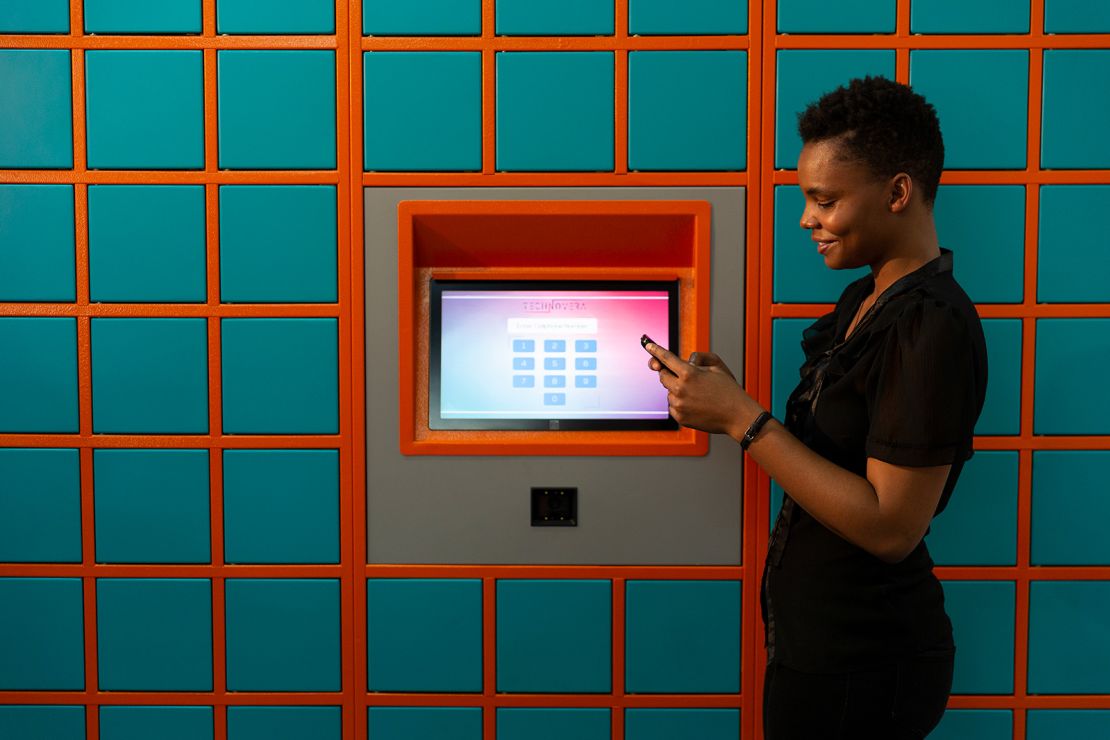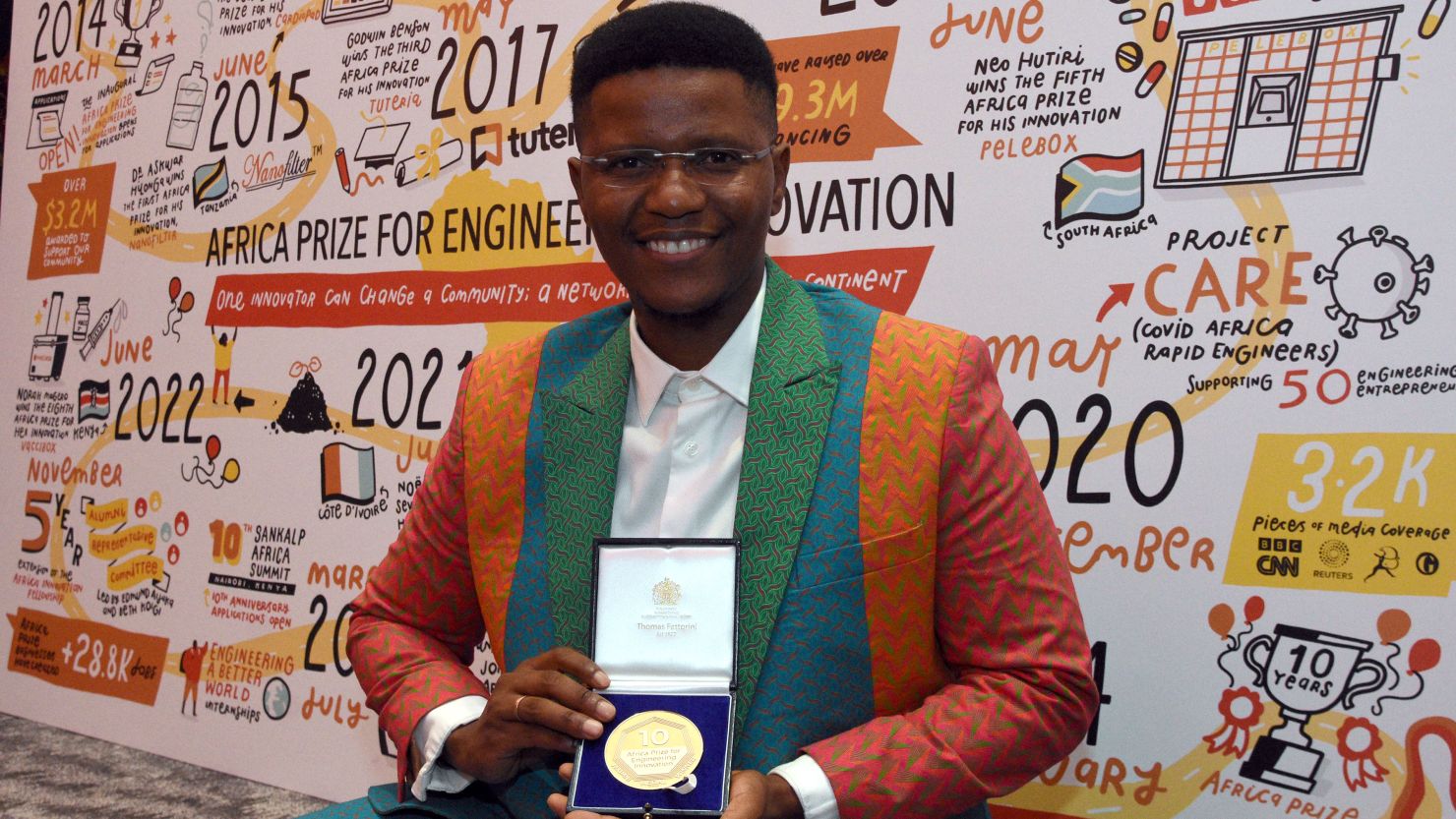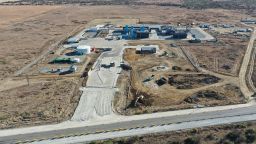A South African entrepreneur who designed a smart locker system that improves access to healthcare has won a major award for African engineering.
Neo Hutiri is the creator of Pelebox, a system of internet-enabled lockers that dispense medication for chronic conditions to patients, helping to cut down queues and ease pressure on hospital resources. He was awarded £50,000 ($63,000) by the UK’s Royal Academy of Engineering, as well as a medal, which was presented by King Charles III’s sister Princess Anne during a ceremony in London on Wednesday evening.
The event marked the 10-year anniversary of the Academy’s prestigious Africa Prize for Engineering Innovation, which recognizes entrepreneurs that have developed technology to address local challenges on the continent, from improving access to power, to adapting to climate change.
For the anniversary, the Academy put on a special edition of the annual competition, dedicated to its alumni. It shortlisted 12 innovations from across six countries that have participated in its training program over the last decade, and after a pitching session during yesterday’s event, a panel of six judges chose a winner. In June, the usual iteration of the Africa Prize will also go ahead, during which four finalists will battle it out for a £25,000 ($31,600) prize.

Hutiri first won the Africa Prize for his lockers in 2019, when he was running a pilot program for the Pelebox concept. Since then, the startup has expanded significantly, and the innovation is now used in 123 healthcare facilities across South Africa, Namibia and Botswana.
“Winning the Africa prize helped open a lot of doors, gave us good recognition, changed a lot of ‘noes’ into ‘yesses’ and ultimately gave us the audience we’re looking for,” he tells CNN. He hopes that the 2024 prize money will help to “catalyze” the company’s growth.
“We want to see Pelebox operating across six countries and this award will position us to build the right team, enhance our product and enable us to continue reaching and creating value for patients that are spending hours and hours in clinics in southern Africa,” he says.
“Incredible solutions”
Just missing out on the anniversary medal were two runners-up who received £15,000 ($19,000) each: Nigerian entrepreneur Aisha Raheem with Farmz2U, a digital platform that prevents food waste by helping farms plan their crops, and Samuel Njuguna, from Kenya, with Chura Limited, which aims to tackle poor mobile signal with a web-based, multi-network system that allows users to move between SIM cards regardless of carrier.
In total the Academy will invest more than £1 million ($1.2 million) this year in alumni of the Africa Prize through grants, prizes and accelerator programs.
The goal, according to Cameroonian technology entrepreneur and prize judge Rebecca Enonchong, is to help scale up engineering innovations and maximize their impact. It’s also an opportunity to showcase African talent to the rest of the world.
“There isn’t enough funding available for African startups,” she tells CNN. “We don’t want all the funding to come in the form of grants, as we see in the Africa Prize. We want investors to start to believe that they can also make money by investing in African startups. But sometimes, in order for those investors to know that these startups exist, an Africa Prize becomes really necessary to give those startups the visibility they need to attract investment.”
Since its founding in 2014, the Africa Prize for Engineering Innovation has supported more than 140 entrepreneurs from across 23 African countries with business training programs, as well as engineering mentoring, communications support and pitching opportunities. The Academy says that alumni from the prize have collectively raised more than $39 million in finance and have introduced more than 470 products and services to the global market.
For Enonchong, it’s vital that the prize represents entrepreneurs from all over the continent. “If you look at the landscape of innovation on the African continent, you’ll see South Africa, Kenya, Nigeria (and) Egypt, getting the most amount of funding and generally the most amount of attention for the founders. That’s not necessarily where all the innovation comes from. It just means that they have stronger, bigger, more developed ecosystems,” she says.
“It’s critical for us to be able to showcase talent from across the continent, because even in small towns and villages on the continent, you have innovators and people that are developing incredible solutions,” she adds.





